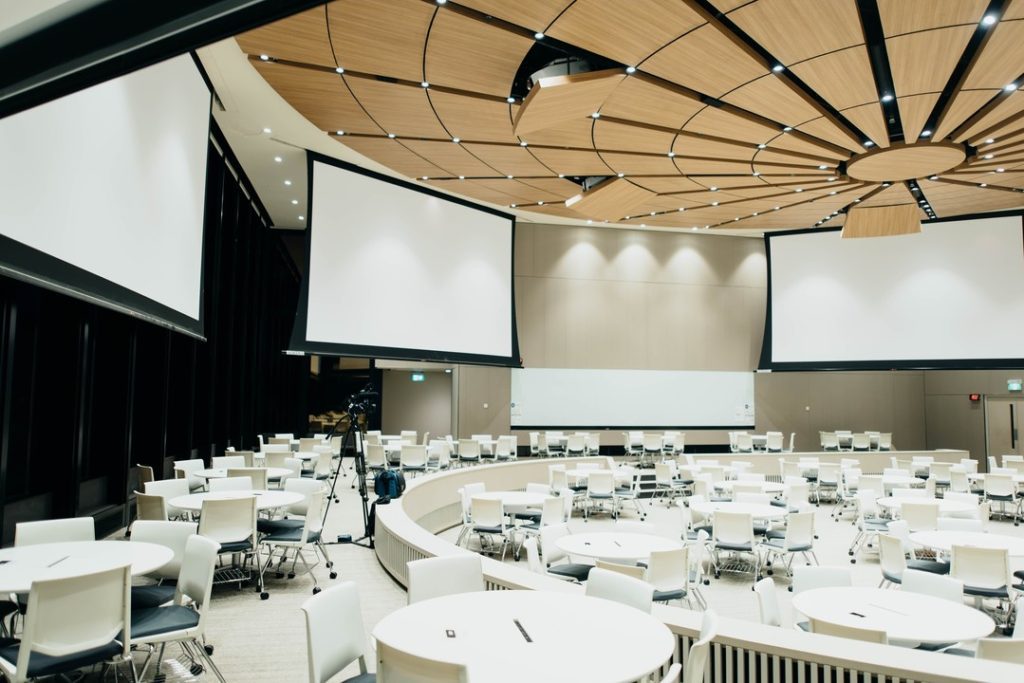With corporate AV revenue projected to reach $91.4 billion by 2029, the push toward sustainable and modular systems has never been stronger. Forward-thinking leaders, like our team at AV-Tech, are championing more energy-efficient solutions that align with environmental, social, and governance (ESG) goals, while maintaining operational flexibility — a win for the AV industry and for the wider business ecosystem we serve.
The demand for greener AV systems stems from the dual pressures of meeting sustainability targets and addressing the growing complexity of corporate AV requirements. Modular systems, which allow components to be replaced or upgraded individually, offer an ideal solution by minimizing waste and ensuring adaptability to future needs.
Reducing Energy Use with Smart Technology
Energy efficiency is at the core of all office buildouts and as such, we are seeing more emphasis placed on sustainable AV Systems. Solutions like LED displays, laser projectors, and automated control systems, can drastically reduce energy consumption via automation. For example, AV systems that power down when not in use save electricity while contributing to an organization’s ESG objectives.
Durable, recyclable components further reduce waste and extend equipment life cycles, making them a cost-effective and environmentally friendly choice. Sustainability means reducing carbon footprints and building AV systems designed to grow with your needs.
Aligning with ESG Goals
Sustainable AV starts with accountability. As corporations face stricter regulations and stakeholder expectations around ESG, AV manufacturers and Integrators are adopting strategies that prioritize both environmental and operational resilience. Modular AV Systems or components make it easier to adapt to these evolving energy standards, avoiding compliance risks and ensuring operational resilience.
Eco-conscious consumers and partners actively seek organizations that back their words with action. Green AV solutions not only help meet regulatory requirements but also foster trust and loyalty, positioning businesses as forward-thinking and responsible leaders.
The Business Case for Modular AV
While initial investments in modular and sustainable AV systems may appear high upfront, they deliver clear long-term value. Energy savings, reduced repair costs, and government incentives, all contribute to a strong ROI. For example, transitioning to LED walls or energy-optimized control systems can result in immediate utility cost reductions.
Modularity truly changes the game in terms of cost efficiency: being able to swap out a single outdated component rather than overhauling an entire system is a drastic improvement—for budgets and the planet. For example, clients who update to Microsoft Teams Room kits, as a standard will have the option to upgrade individual components as the advancement of AI increases, and the obsolescence of specific components occurs. You will likely not have to upgrade your display or speaker systems, but you may need to swap out your compute-unit for more CPU horsepower. Cameras will likely be an aspect where we see the options for upgrade happen more rapidly, as facial recognition and multi-image capture becomes a standard across UC platforms. We see these modular aspects as standard for most clients and the designs being engineered and implemented.
How to Get Started
Start with a full evaluation of your existing AV systems. Look for high-energy components and inefficiencies that can be addressed, creating a clear plan for meaningful upgrades.
Adding remote collaboration tools is another strategic move. These systems not only cut down on travel-related emissions but also help meet ESG targets while keeping costs in check.
Building a Resilient Future
Adopting modular, sustainable AV solutions reflects a forward-thinking approach to the challenges of modern business. Organizations that integrate sustainability and adaptability into their strategies, are setting the standard for corporate AV Systems. These efforts not only address current needs but also create a foundation for innovation and leadership in an environmentally conscious marketplace.


